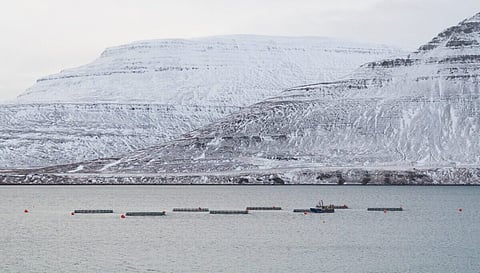

An aquaculture farm outside the town of Isafjordur, Iceland, in the Icelandic westfjords.
Photo: Adobe Stock.
An overwhelming majority of Icelanders - 65.4% - oppose open-net salmon farming. In contrast, just 13.9% of Iceland's population is in favor of marine aquaculture. This is according to the survey 'Attitudes towards salmon farming in open sea cages' conducted by Gallup in July 2024 at the request of the Iceland Nature Conservation Association (INCA).
Likewise, the results also indicate that almost 70% go so far as to want to ban sea cage farming, and almost 62% consider the welfare of sea cage-farmed salmon to be poor.
Commenting on the poll, Jón Kaldal of the Iceland Nature Conservation Association told Icelandic media Vísir that opposition has never been higher in Gallup polls, with more people wanting a ban than before. He added that this new question on the issue of welfare in sea cage farming shows that people are becoming aware of the "dark side of the industry."
The survey sample was 1,948, and the final number of respondents was 915, resulting in a participation rate of 47%. According to Gallup, the research data is weighted so that the sample reflects the population in terms of gender, age, and residence.
On that sample, the survey results reveal that opposition to open-net salmon farming is widespread across all age and income groups, among both men and women, in all constituencies, and even among voters of all political parties.
Specifically, opposition to marine aquaculture is almost total - 97% - among Pirate Party supporters and reaches 78% among those who vote for the Social Democratic Alliance. Meanwhile, in the Independence Party and the Progressive Party, opposition is also greater than support, although it is around 40% - this is 43% among Independence Party voters and 39% among Progressive Party voters.
Although the survey is commissioned by the Iceland Nature Conservation Association, its spokesperson, Jón Kaldal, told Vísir that he does not fear that those who support sea cage farming will dismiss the results because the survey was commissioned by his organization.
Kaldal claimed not to have any concerns in this regard since Gallup conducts the survey according to its recognized scientific methodology. He further added that other pollsters have also examined Icelanders' stance on this issue on their own initiative, and the results are almost identical. "Four to five times more people are against this harmful industry than support it," he stated to the Icelandic media.
Finally, the representative of the Iceland Nature Conservation Association stated the results are particularly gratifying for them because they were achieved after what he described as an "intense image advertising campaign" carried out on television and the Internet by Fisheries Iceland (SFS). "It is gratifying to have confirmation that the nation sees through this glossy SFS propaganda," Jón Kaldal told Vísir.
Opponents to open-net salmon farming in Iceland argue their negativity by citing the risk of escapes and mixing with wild salmon, environmental impact and pollution, fish infections, or animal cruelty, among others, but also that profits go abroad as most of the salmon-producing companies are foreign-owned.
In contrast, those who are in favor of salmon farming in sea cages cite job creation, the important food production of a quality product, and the creation of value that brings foreign exchange to the country as the main reasons for their support.
It is worth remembering that when the salmon industry was reactivated in the country in 2004, all production areas were located in the East and West Fjords precisely because there are no salmon rivers in those areas so, in case of an eventual escape, it was avoided that farmed fish could be genetically mixed with wild salmon stocks.
Twenty years on, however, both supporters and opponents have arguments to back them up. The country started the year with an unprecedented increase in the value of its aquaculture exports, but 2024 has also been the year in which Iceland has had to allocate additional funds to prevent fish escapes. And all this while still negotiating its future Aquaculture Law.
*Sources:
- 'Mikill meirihluti landsmanna mótfallinn sjókvíaeldi', Vísir article by Jakob Bjarnar.
- 'Attitudes towards salmon farming in open sea cages', Gallup poll commissioned by Iceland Nature Conservation Association.
